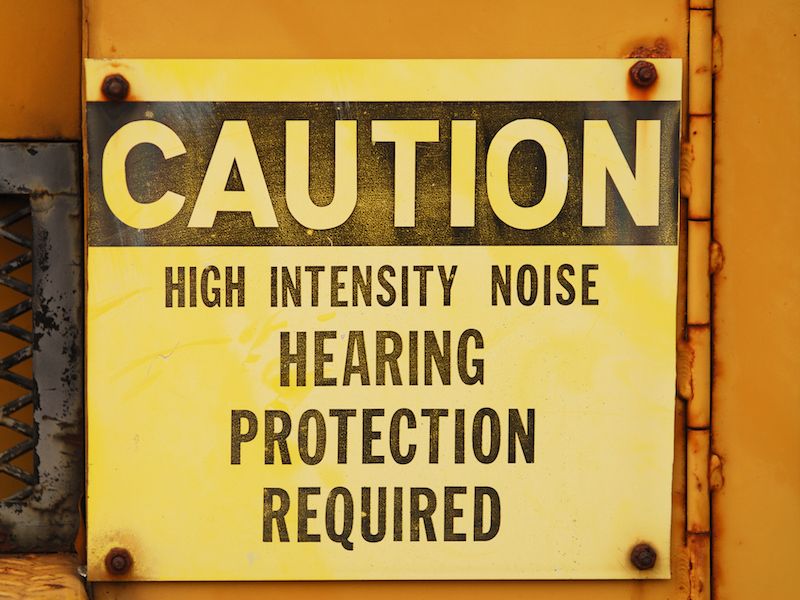
It’s one thing to know that you should protect your hearing. Knowing when to protect your ears is another matter. It’s not as easy as, for example, recognizing when to use sunscreen. (Is it sunny and are you going to be outside? Then you need sunscreen.) It’s not even as simple as determining when to wear eye protection (Doing some hammering? Cutting some wood or working with hazardous chemicals? Use eye protection).
When dealing with when to wear hearing protection, there seems to be a large grey area which can be dangerous. Usually, we’ll defer to our normal inclination to avoid hearing protection unless we’re given information that a specific place or activity is dangerous.
A Tale of Risk Assessment
In general, we’re not very good at assessing risk, especially when it comes to something as intangible as permanent hearing damage or hearing loss. Let’s take some examples to prove the point:
- Person A goes to a very loud rock concert. The concert lasts around 3 hours.
- Person B owns a landscaping company. She spends a considerable amount of time mowing lawns, then she goes home to a quiet house and reads a book.
- Person C is an office worker.
You might believe the hearing hazard is greater for person A (let’s just call her Ann). Ann leaves the performance with ringing ears, and she’ll spend the majority of the next day, struggling to hear herself speak. Presuming Ann’s activity was hazardous to her hearing would be sensible.
The noise that person B (let’s just call her Betty), is subjected to is not as loud. Her ears don’t ring. So her hearing must be safer, right? Well, not quite. Because Betty is mowing every day. So although her ears don’t ring out with pain, the injury accrues gradually. If experienced too often, even moderately loud noise can have a damaging affect on your ears.
What’s occurring with person C (let’s call her Chris) is even tougher to make sense of. Lawnmowers have instructions that indicate the risks of persistent exposure to noise. But although Chris has a relatively quiet job, her long morning commute through the city each day is rather loud. In addition, she sits at her desk and listens to music through earbuds. Is protection something she should consider?
When is it Time to Begin to Think About Protecting Your Hearing?
The general rule of thumb is that if you need to raise your voice in order to be heard, your environment is loud enough to do damage to your ears. And you really should consider using earmuffs or earplugs if your surroundings are that loud.
The cutoff should be 85dB if you want to be scientific. Noises above 85dB have the capacity to result in damage over time, so you should consider using ear protection in those situations.
Many hearing specialists advise making use of a specialized app to keep track of decibel levels so you will be cognizant of when the 85dB has been reached. You will be able to take the correct steps to safeguard your ears because these apps will tell you when the sound is reaching a dangerous volume.
A Few Examples
Your phone might not be with you anywhere you go even if you do get the app. So we might develop a good baseline with a couple of examples of when to protect our hearing. Here we go:
- Working With Power Tools: You recognize you will need hearing protection if you work every day in a factory. But what if you’re simply puttering around your garage all day? Even if it’s only a hobby, hearing specialists suggest wearing hearing protection if you’re working with power equipment.
- Exercise: Your morning cycling class is a good example. Or perhaps your daily elliptical session. All of these cases might call for ear protection. Those trainers who use sound systems and microphones (and loud music) to motivate you might be good for your heart rate, but all that volume is bad for your hearing.
- Commuting and Driving: Driving all day as an Uber or Lyft driver? Or perhaps you’re just hanging out downtown for work or boarding the train. The constant noise of living in the city, when experienced for between 6 and 8 hours every day, can cause damage to your ears over the long haul, specifically if you’re turning up your music to hear it over the commotion.
- Listening to music with earbuds. OK, this doesn’t call for protection but does require caution. Give consideration to how loud the music is, how long you’re playing it, and whether it’s playing directly into your ears. Noise-canceling headphones are a smart choice to prevent needing to turn the volume way up.
- Every day Chores: Even mowing the lawn, as previously stated, calls for hearing protection. Chores, like mowing, are probably something you don’t even think about, but they can lead to hearing damage.
A strong baseline may be researched by these examples. If there is any doubt, though, use protection. Compared to leaving your ears exposed to future damage, in most cases, it’s better to protect your ears. If you want to be able to hear tomorrow, protect today.